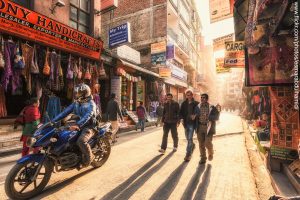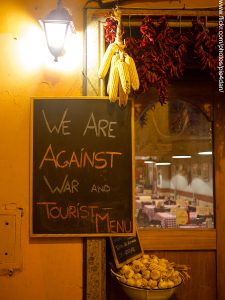 As we all know, not everyone who ventures beyond their home city or country has the same approach to travel. Some are tourists and some are travelers.
As we all know, not everyone who ventures beyond their home city or country has the same approach to travel. Some are tourists and some are travelers.
And it’s pretty easy to tell the difference…well, that’s not entirely accurate. It’s pretty easy to spot a tourist, but the traveler tends to blend in, so you may not even notice he’s there at all.
Tourists, you might say, stick to the beaten path and seek the stereotypical. When they visit France, they want to be treated rudely be a Parisian while eating a croissant in front of the Eiffel Tower.
That may be a bit of an exaggeration, but not by much. And while there isn’t anything inherently wrong or bad about this approach to travel, it’s not the preferred method of those who have the desire to truly immerse themselves in a new culture.
If you want to become more of a traveler, her are a few tips to help you change your perspective.
Travelers may have a guidebook but they don’t treat it like a bible. In fact, the actively try to find interesting things to do, see and eat that aren’t in the guidebook. They may ask locals for their recommendations or they may just wander around and keep their eyes peeled for hidden gems. Either way, they relish the opportunity to go where they are the only tourists and to discover places that other visitors don’t know about.
Dining is one of the best reasons to stray from the beaten trail. Often the restaurants listed in guidebooks or those along the busiest roads are just overpriced, watered-down versions of local cuisine. The places best loved by locals usually don’t look like much from the outside but serve up the best food in the city. The ambiance might not be amazing, but you’ll have a much more authentic experience than you would in the tourist-friendly restaurant right next door to the museum. 
The reason why tourists stick out like a sore thumb is because they make very little effort to fit in with the locals. Travelers, on the other hand, do a little preparation before taking a trip in order to assimilate and immerse themselves in a new place.
So, if you’re heading to a different country you should learn some basic phrases in their language first. You don’t need to become fluent or even conversational, but being able to say simple things like, “Good morning” and “thank you” in the native tongue go a long way to helping you show respect for the place you’re in.
Likewise, it’s a good idea to look into the style of dress of the place where you’re going. Of course you shouldn’t buy a whole new wardrobe to fit in, but you may feel more comfortable and have a better experience if your appearance doesn’t scream, “Tourist!” when you walk down the street.
One big difference between tourists and travelers is that tourists always play it safe – basically, they only do something if Rick Steves tells them to. If anything seems a little too foreign or unusual, they run for the hills…“the hills” being their hotel.
But if you’re too afraid to try something that just may turn out to be weird, you’ll miss out on many things that turn out to be truly amazing and memorable. After all, many of the best travel stories start out with, “We had no idea what was going to happen but we did it anyway.”
Tourists feel the desperate need to see every single site in a place they visit. There’s nothing wrong with wanting to get the most out of your trip, but strict adherence to certain requirements usually results in a fairly unpleasant time. What you end up with is a trip spent rushing from one landmark to the next, snapping pictures as proof that they were there. Assuming that one of the goals of your trip is enjoyment and relaxation, this is not the way to go.
Certainly there will be things that you really want to do, but you should leave plenty of room for the unexpected. Sure, you’d planned to go to that famous museum at 2 o’clock but you happened to meet a local who spontaneously invited you to have lunch with her family in their gorgeous backyard overlooking the water. Are you really going to turn down that unique experience because of your itinerary? If you’re a true traveler, not a chance.
There’s no getting around the fact that travel sometimes involves discomfort. It’s just part of the reality of getting from one place to another and being somewhere unfamiliar. At any given time, in any place, the following is likely to happen: You get lost, you get sick, you have a bad meal, you have to stand when you’d like to sit, something smells bad, someone is rude to you, your feet hurt, there’s a language misunderstanding, it’s annoyingly crowded, etc.
Travelers know that these small discomforts are par for the course and they do their best not to be too dramatic when they happen. The point is that all of these inconveniences are merely that: inconvenient. If you’re fortunate enough to travel, you should try to keep things in perspective. Sure, your feet hurt and you’re lost and hungry…but you’re lost and hungry and hurting in the Tuscan countryside. It could be a lot worse.
We all have our tourist moments when we travel. We get sick of the local food, annoyed by the customs or embarrassingly out ourselves as an outsider.
But those moments are usually outnumbered by the times where we make a great connection with a local, discover something new to love or just have a passing understanding of how big the world is. And if you travel with the perspective of a true traveler, you’ll find that these perfect little moments start to come around a lot more often.








5 great tips to help tourists become more of a traveler.
Good article, Jay.
We’ve been traveling and living in the world since May 2008. We often have a chuckle meeting tourists and listening to their travel complaints. Tourists seem to forget they are the foreigner when they travel overseas and it’s a different culture. So, everything they are used to at home in their country won’t be the same. Your rule #5 is our reply to tourists when we meet them off the beaten path.
Michael and Gina
Bangkok, Thailand
What a great article! I am forever trying to explain this to people, particularly number 5. You just have to roll with the punches. It’s all part of the adventure of life. Thanks for writing.
Thanks for writing.
Shannon
I like point number two – try to fit in, do what you can to experience the local culture and foods – some of these sites that have popped up in the last 5-10 years or so connecting travelers with locals are invaluable. As an example, you will have an entirely different experience in a Thai village in the Thailand countryside vs a “touristy” visit to Bangkok
Interesting list! I bet many people might be a blend between the two. A hybrid!